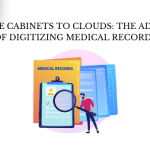Benefit of Scanning and Indexing Rare Artifacts and Historical Documents
Rare artifacts and historical documents are considered highly valuable. They offer valuable insights into the past as a remembrance of people of older generations. However, these historical documents are fragile and easy to get damaged. To ensure the preservation of important artifacts, scanning and indexing services are the premier choice for all kinds of business. Anyway, let’s explore some possible motives for safeguarding rare artifacts and historical documents using scanning and indexing services.
Documenting History with Scanning and Indexing: Why Preservation Matters!
Preservation of Fragile Artifacts
Historical items hold significant value and help us understand how far human civilization has come. Therefore, the preservation of these rare documents is one of the topmost priorities. The majority of them are aged over a hundred years, and plenty of chances exist for irreversible damage. However, scanning and indexing these artifacts is an intelligent choice that helps future generations to explore and appreciate.
Digitizing these critical documents can be beneficial as it not only mitigates the risk of wear and tear but also acts as a backup to create duplicates. In the short term, their value and existence will never be gone. Scanning and indexing services use advanced tools and equipment that capture high-resolution images that can retain intricate details of historical artifacts from the brink of destruction.
Accessibility and Research
Research and study are crucial factors and primary benefits of indexing historical artifacts. As time goes on, this delicate piece of paper can quickly deteriorate. Scanning and indexing facilitate the accessibility of essential artifacts.
Some historical artifacts have hidden messages, keys, codes, and hidden meanings. These types of historical articles contain concealed maps and hints that can guide you to a treasure or a location with historical significance. Only a selected few had limited access to these documents. But, with proper digitization of paper documents, these messages or clues can be passed on to the next generations, yielding the quest.
Any document that is scanned and indexed can be accessed remotely, breaking down geographical barriers and democratizing knowledge. Moreover, researchers can unlock new avenues to explore the documents without the constraints of physical proximities. In a nutshell, scanning and indexing have enabled researchers, scholars, students, etc, to explore a wealth of historical knowledge and insights with ease.
Conservation and Security
Picture yourself in a museum home to a collection of documents, jewels, and relics dating back over two centuries. Imagine that a fire broke out at the museum and some of the valuable artifacts suffered from fire damage. We cannot reverse the situation, and we have lost valuable assets forever.
Digitization services are pivotal in the long-term preservation and protection of rare historical documents. So, you can save valuable assets of significant value with scanning and indexing services. In addition, the digitization of papers and artifacts guarantees the long-term preservation of documents.
Digital copies serve as an insurance policy against potential destruction that ensures our heritage remains intact even in times of unforeseen disasters such as fires, floods, or other natural disasters. Moreover, digital preservation techniques contribute to the longevity—and preservation of these articles, allowing future generations to explore and learn from them.
Storytelling and content creation
Historical artifacts and documents have their own stories to tell! Digitizing historical artifacts with advanced scanning tools enables writers and journalists to treasure old stories via articles, Wikipedia, novels, and other ways.
For example, the Declaration of Independence portrays the story of freedom and the fight. Meanwhile, the Vinland map is all about historical scrutiny and is full of symbols, codes, and tales of ancient civilizations. Digitizing these historical artifacts empowers journalists to conduct research, access real-time images, and craft journalistic pieces.
Only authorized staff are capable of touching or handling historical artifacts. But, scanning and indexing services can make replicas by accurately capturing the document. This empowers writers and journalists to compose articles where readers can obtain insight into minute elements. Creating content about historical artifacts motivates content creators and archaeologists to not only acquire knowledge but also to fuel their passion.
Interactive experience (AR, VR)
Both augmented reality and virtual reality can help people with disabilities access knowledge of historical artifacts. By harnessing the power of scanning and indexing, you can engage with a broader audience effectively. In addition, this facilitates cross-cultural understanding by interacting with people of different diversities without traveling around the world.
Advanced scanning and indexing tools foster augmented reality interactions that promote inclusivity to all users. In addition, both AR and VR are excellent choices for educational and entertainment purposes. Digitized documents can serve as virtual travel experiences and interactive educational tools tailored for young learners. Through realistic imagery and digital components, individuals can engage with history in unprecedented ways.
Conclusion
The benefits of scanning and indexing historical artifacts and documents are simply underestimated. With advanced scanning tools and equipment, you can preserve fragile items that possess substantial value in culture. It’s crucial to invest in digital technologies to safeguard and preserve our rich culture, which contains valuable artifacts, historical documents, and collective heritage. Join hands with Scanning and Indexing services to digitalize the rich tapestry of your past for a better future. Reach us via mail at [email protected] to learn more about our services.






